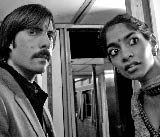The Disorienting Express: The Darjeeling Limited
by George Sax

The audience-measuring folks at Arbitron report that if you’re a typical moviegoer, you’ll arrive at the theater 24 minutes before the previews begin. If you’re what the company considers a “frequent moviegoer” (four movies in the last three months), you’ll be there 28 minutes before they start.
But if you go to a theater showing Wes Anderson’s The Darjeeling Limited, you’ll have to add another 13 minutes to whatever wait you’ll have before the feature begins. That’s because the film is preceded by a short of that length, Hotel Chevalier, that Anderson made two years ago, before he began work on the feature. It stars Jason Schwartzman, who’s in Darjeeling, and Natalie Portman, who’s not.
Hotel Chevalier has been getting a more favorable response at festivals and online than the feature. I don’t really understand why; the short is nothing much more than a rather tonally monochromatic prologue to the main attraction. It may have something to do with Ms. Portman’s appearance in a state of dishabille.
As for Darjeeling, it is indeed a trip. It’s probably the most striking, and perhaps the most memorable, of Anderson’s five films. This doesn’t mean that it’s the best, or even that it’s good. You can come away from it wondering if summary judgments of either good or bad are relevant to the experience it offers. And I’ll guess a lot of people will dismiss the question, and the picture, as piddling.
Darjeeling has been fashioned as a road picture, a railroad picture. And it does begin in Darjeeling, India, where the three estranged, well-heeled Whitman brothers, Francis (Owen Wilson), Peter (Adrien Brody) and Jack (Schwartzman), board a train for the country’s rural interior. They’ve been summoned by Francis—the eldest, habitually controlling one—for a reconciliatory spiritual journey, “where we seek the unknown,” as he solemnly tells the other two. He’s also arranged for them to reunite with their long-absent mother (Angelica Huston), who has joined a convent. (Don’t come, she has wired them, because there is a man-eating tiger in the vicinity.)
Seriousness of purpose, focus and cooperation aren’t prominent elements in the brothers’ behavior. They’re arrested, mistrustful and self-centered. None of them could recognize spirituality if he spent six years in an ashram. Their one stop at a Hindu holy site is quickly adjourned so they can shop for expensive geegaws and native fashions at a bazaar. They’re all inveterate consumerists.
The Whitmans’ cluelessly self-absorbed and interrupted trip doesn’t lead to deep enlightenment, although they do achieve a measure of mutual tolerance and renewed affection. These begin to develop after they have a sobering experience with death, faith and suffering in a remote village. Anderson—who shares the writing credit with Wilson, Schwartzman and Roman Coppola—is surprisingly effective introducing this calming, sensitive interlude into the picture’s low key weirdness. It brings to the surface poignance that seems to lurk beneath the wry presentation of neurotic evasion and self-indulgence.
And speaking of weirdness, we can’t ignore the Oscar Wilde-life-imitates-art aspect of Wilson’s appearance in the film. Frances greets the other two with his battered, bruised face framed by a head bandage, the result of a motorcycle collision with a hillside—not really an accident, as he eventually admits. Wilson’s recent unsuccessful suicide attempt gives a creepy anticipatory feel to this plot device.
Darjeeling is inflected by a number of bemusing, unremarked minor anomalies. When the three brothers finally find their mother, she comes out to meet them carrying a volume with a portrait of Thomas Jefferson on the cover. Nobody seems to notice that Jack goes through most of the picture barefoot while wearing a grey business suit. The steward who gets so fed up with the Whitmans’ disruptions that he throws them off the train looks almost stereotypically Indian but speaks with an American accent.
This tone of arch obscurity is part of what makes Anderson’s work alternately amusing and preciously off-putting. His film sometimes seems like a collaboration between Jim Jarmusch and W.C. Fields, or maybe Fields and Michelangelo Antonioni. Anderson has developed a style of deadpan whimsy.
There is also his slightly disconcerting, amused affection for his characters. He doesn’t really judge, and he never really satirizes. In fact, there is an uneasy sense of distanced, emotional displacement in Anderson’s films, especially here, not just among his characters, but in the director’s work itself.
In Darjeeling he seems to be holding back something from us and himself.
|
Issue Navigation> Issue Index > v6n43: Halloween (1/25/07) > The Disorienting Express: The Darjeeling Limited This Week's Issue • Artvoice Daily • Artvoice TV • Events Calendar • Classifieds |









 Current Issue
Current Issue